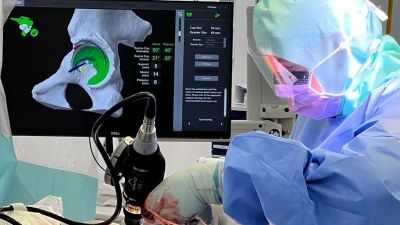Million pound robot being tested in Hexham could help surgeons replace hips more successfully

A million-pound robot is being tested by NHS surgeons in Northumberland with the aim of helping them put in replacement hips more accurately.
It is hoped the cutting-edge technology will allow patients to avoid going through more surgery by making their new hips last longer, and in doing so save the NHS money.
Consultant orthopaedic surgeon Tim Petheram, from Northumbria Healthcare NHS Foundation Trust, has been using the robot, made by Stryker.
He said it could be more accurate than some surgeons with decades of experience.
“A hip replacement is a ball in a socket. And the components are currently put in using our experience and best judgement," he said.
“But it is just that - human judgement. And in 2022, we can do better. And that's what this is.
"It's digital, based on a 3D CT scan, and it's very, very accurate to within a degree and a millimetre. So we're putting the components in much better.”
Sharon Rose, 53, from North Shields, is one of the patients to have benefitted from the trial.
Because this is a study, she does not know whether or not the surgical robot was used in her operation.
But, she said: "I am quite excited because I think this is the future.
"And if I can help somebody in the future to make things better for them, that is why I wanted to go for it.
"Just for the future, and for the staff to learn all the time. And I thought it was a good thing to do.”
The benefit, according to Mr Petheram, is that it could make Ms Rose’s replacement hip last longer.
And, by avoiding further surgery, it could also improve the NHS’s finances.
Mr Petheram said that researchers already know that the robot helps to put in replacement hips more accurately.
“What we don't know is whether patients actually feel better because of that,” he said. “And do the hip replacements last longer?”
He added: "[The NHS] is very happy to spend money on new technology, and this robot costs nearly £1 million which is fine if it is going to make patients better and make the outcomes better.
"But it's not fine if it makes no difference. And that's what we need to look into. And that's what this research is all about.”
Participants in the study will be selected at random to receive their hip replacement either with the robot or by a human surgeon alone, to find out which surgical technique results in better outcomes.
Researchers will ask questions about people's ability to complete activities, their long-term quality of life and will also try to find out which method provides the best value for the NHS.
The research is being supported by leading professional bodies including the Royal College of Surgeons, British Hip Society and British Association of Knee Surgery.
Listen to our latest podcasts to find out What You Need To know...